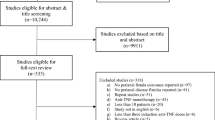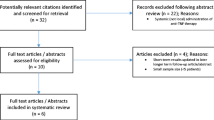Abstract
Background
Crohn’s disease perianal fistulae (CD-PAF) occur in 25% of patients and are notoriously challenging to manage. Tumor necrosis factor inhibitors are first line agents.
Aims
The aim of this study was to compare infliximab (IFX) versus adalimumab (ADA) efficacy in CD-PAF healing over time.
Methods
A retrospective study at two large-tertiary medical centers was performed. Inclusion criteria were actively draining CD-PAF and initial treatment with IFX or ADA following CD-PAF diagnosis. The primary endpoints were perianal fistula response and remission at 6 and 12 months. Secondary endpoints included biologic persistence over time and dose escalation at 6 and 12 months.
Results
Among 151 patients included in the study, 92 received IFX and 59 received ADA as first line agents after CD-PAF diagnosis. At 6 months, the 64.9% of the IFX group and 34.8% of the ADA group demonstrated CD-PAF clinical improvement (p < 0.01). Univariate and multivariate analyses demonstrated significant differences among the IFX and ADA groups for clinical response at 6-months and 12-months (p = 0.002 and p = 0.042, respectively). There were no factors that predicted response, with the exception of concomitant immunomodulator affecting the 6-month clinical response (p = 0.021). Biologic persistence, characterized by Kaplan Meier methods, was significantly longer in the IFX group compared to the ADA group (Log-rank p = 0.01).
Conclusion
IFX induction and maintenance is associated with higher rates of response and remission in CD-PAF healing as well as higher treatment persistence compared to ADA. Additionally, our study supports the use of concomitant immunomodulator therapy for CD-PAF healing and remission.

Similar content being viewed by others
References
Mak WY, Mak OS, Lee CK et al. Significant medical and surgical morbidity in perianal Crohn’s disease: results from a territory-wide study. J. Crohn’s Colitis. 2018;12:1392–1398.
Panes J, Reinisch W, Rupniewska E et al. Burden and outcomes for complex perianal fistulas in Crohn’s disease: systematic review. World J. Gastroenterol. 2018;24:4821–4834.
Yarur AJ, Kanagala V, Stein DJ et al. Higher infliximab trough levels are associated with perianal fistula healing in patients with Crohn’s disease. Aliment. Pharmacol. Ther. 2017;45:933–940.
Schwartz DA, Loftus EV, Tremaine WJ et al. The natural history of fistulizing Crohn’s disease in Olmsted County, Minnesota. Gastroenterology. 2002;122:875–880.
Adegbola SO, Dibley L, Sahnan K et al. Burden of disease and adaptation to life in patients with Crohn’s perianal fistula: a qualitative exploration. Health Qual Life Outcomes. 2020;18:370.
Vasudevan A, Bruining DH, Loftus EV, Faubion W, Ehman EC, Raffals L. Approach to medical therapy in perianal Crohn’s disease. World J. Gastroenterol. 2021;27:3693–3704.
Present DH, Rutgeerts P, Targan S et al. Infliximab for the treatment of fistulas in patients with Crohn’s disease. N. Engl. J. Med. 1999;340:1398–1405.
Colombel J-F, Schwartz DA, Sandborn WJ et al. Adalimumab for the treatment of fistulas in patients with Crohn’s disease. Gut. 2009;58:940–948.
Hanauer SB, Sandborn WJ, Rutgeerts P et al. Human anti-tumor necrosis factor monoclonal antibody (Adalimumab) in crohn’s disease: the CLASSIC-I Trial. Gastroenterology. 2006;130:323–333.
Sandborn WJ, Rutgeerts P, Enns R et al. Adalimumab induction therapy for Crohn disease previously treated with infliximab: a randomized trial. Ann. Intern. Med. 2007;146:829–838.
Singh S, Proctor D, Scott FI, Falck-Ytter Y, Feuerstein JD. AGA technical review on the medical management of moderate to severe luminal and perianal fistulizing Crohn’s disease. Gastroenterology. 2021;160:2512-2556.e2519.
Sandborn WJ, Fazio VW, Feagan BG, Hanauer SB. AGA technical review on perianal Crohn’s disease. Gastroenterology. 2003;125:1508–1530.
Ji C-C, Takano S. Clinical efficacy of adalimumab versus infliximab and the factors associated with recurrence or aggravation during treatment of anal fistulas in Crohn’s disease. Intest Res 2017;15:182–186.
Gisbert JP, Marín AC, McNicholl AG, Chaparro M. Systematic review with meta-analysis: the efficacy of a second anti-TNF in patients with inflammatory bowel disease whose previous anti-TNF treatment has failed. Aliment. Pharmacol. Ther. 2015;41:613–623.
Taxonera C, Schwartz DA, García-Olmo D. Emerging treatments for complex perianal fistula in Crohn’s disease. World J. Gastroenterol. 2009;15:4263–4272.
Sands BE, Anderson FH, Bernstein CN et al. Infliximab maintenance therapy for fistulizing Crohn’s disease. N. Engl. J. Med. 2004;350:876–885.
Colombel JF, Sandborn WJ, Rutgeerts P et al. Adalimumab for maintenance of clinical response and remission in patients with Crohn’s disease: the CHARM trial. Gastroenterology. 2007;132:52–65.
Castaño-Milla C, Chaparro M, Saro C et al. Effectiveness of adalimumab in perianal fistulas in crohn’s disease patients naive to anti-TNF therapy. J. Clin. Gastroenterol. 2015;49:34–40.
De Gregorio M, Lee T, Krishnaprasad K et al. Higher anti-tumor necrosis factor-α levels correlate with improved radiologic outcomes in Crohn’s perianal fistulas. Clin. Gastroenterol. Hepatol. 2022;20:1306–1314.
Gu B, Venkatesh K, Williams AJ et al. Higher infliximab and adalimumab trough levels are associated with fistula healing in patients with fistulising perianal Crohn’s disease. World J. Gastroenterol. 2022;28:2597–2608.
Strik AS, Löwenberg M, Buskens CJ et al. Higher anti-TNF serum levels are associated with perianal fistula closure in Crohn’s disease patients. Scand. J. Gastroenterol. 2019;54:453–458.
Plevris N, Jenkinson PW, Arnott ID, Jones GR, Lees CW. Higher anti-tumor necrosis factor levels are associated with perianal fistula healing and fistula closure in Crohn’s disease. Eur. J. Gastroenterol. Hepatol. 2020;32:32–37.
Bouguen G, Siproudhis L, Gizard E et al. Long-term outcome of perianal fistulizing crohn’s disease treated with infliximab. Clin. Gastroenterol. Hepatol. 2013;11:975-981.e974.
Zhu M, Xu X, Feng Q et al. Effectiveness of infliximab on deep radiological remission in Chinese patients with perianal fistulizing Crohn’s disease. Dig. Dis. Sci. 2021;66:1658–1668.
Acknowledgments
This study was supported by the Leona M. and Harry B. Helmsley Charitable Trust.
Author information
Authors and Affiliations
Corresponding author
Ethics declarations
Conflict of interest
The authors of this study have no financial disclosures or conflicts of interest.
Ethical approval
This study was approved by the Institutional Review Boards of Johns Hopkins University and the University of California, Los Angeles (UCLA).
Additional information
Publisher's Note
Springer Nature remains neutral with regard to jurisdictional claims in published maps and institutional affiliations.
Rights and permissions
Springer Nature or its licensor (e.g. a society or other partner) holds exclusive rights to this article under a publishing agreement with the author(s) or other rightsholder(s); author self-archiving of the accepted manuscript version of this article is solely governed by the terms of such publishing agreement and applicable law.
About this article
Cite this article
Maas, L., Gao, R., Cusumano, V. et al. Superior Efficacy of Infliximab Versus Adalimumab for First-Line Treatment of Crohn’s Perianal Fistulae. Dig Dis Sci 68, 3994–4000 (2023). https://doi.org/10.1007/s10620-023-08060-7
Received:
Accepted:
Published:
Issue Date:
DOI: https://doi.org/10.1007/s10620-023-08060-7




